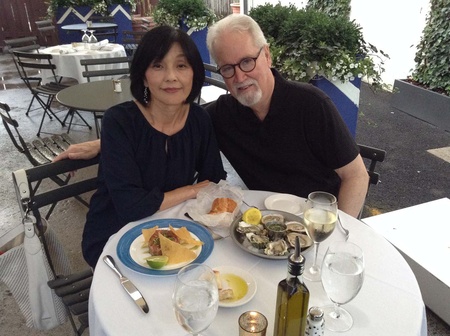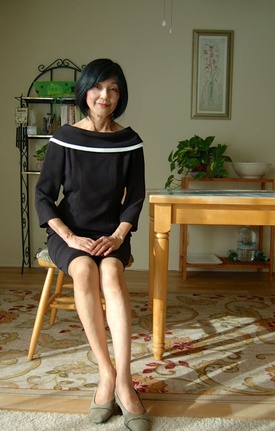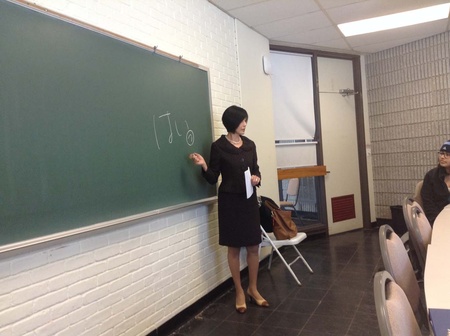My daughter's ballet training was the trigger for me to move to the US
The so-called "Shin-Issei" are people who were born in Japan but emigrated to America of their own volition. Kugimiya Fumiko, who currently lives in Torrance, a suburb of Los Angeles, decided to move to America when she was approaching her mid-50s. Moreover, she ran a vocational school in Oita City called Oita Air Business Academy for people aiming to work in the aviation industry. In addition to running the school, she was invited by government agencies, companies, and universities to teach secretarial skills, honorific language, etiquette, and other business etiquette. Having been successful as a business owner and educator, she closed the school, handed over her seminar work to her juniors, and moved to America alone in 2012. The reason for this was her remarriage to American opera singer Thomas Mooney.
"I met him in 2007 or 2008. Every summer, I would send my second daughter, who had been learning ballet since she was three, to a summer program at the School of American Ballet Theater in New York. The school was near Lincoln Center, so my husband called out to me near the fountain while I was dropping her off. After that, we started talking via Skype even after I returned to Japan. We would meet in New York every summer and talk via Skype for the rest of the year, and this continued for four or five years."
After graduating from Waseda University, Fumiko worked as a cabin attendant for All Nippon Airways for seven years, then returned to her hometown of Oita Prefecture to marry a man arranged by her parents. They had two daughters, but divorced their husband shortly after their second daughter was born. In order to support herself, she began looking for a job, hoping to use her experience as a cabin attendant to teach the manners and language required to work in the aviation industry, as well as the employment situation in the industry. "However, no one would hire me. So I decided I had no choice but to do it myself, and started a vocational school," she recalls. Eventually, Fumiko's reputation as a lecturer spread, and her teaching jobs increased exponentially.
She met Thomas about 10 years after she set up the school. "I never thought I'd get married. Plus, I was teaching at the school myself, so I could have continued working even at age 70 if I had the desire to."
However, she accepted Thomas' proposal and moved to the U.S. "My second daughter was planning to study abroad in Toronto from high school. I wondered what else I would have left to do besides work after my two daughters became independent. So I decided to challenge myself to a new life with him in the U.S."
They got married in January 2013 and moved to Greenwich, Connecticut, far from New York. "It was a culture shock. When I first came to the US, I didn't have a social security number and couldn't drive a car myself. You couldn't get anywhere by walking, and even to go to your neighbour's house you had to drive. One day, I wondered how long it would take to walk to the nearest bus stop, but it took more than an hour. So when my husband was away at work, I had no choice but to stay locked up in my house like I was under house arrest."
Building better relationships through communication skills
Desperate to escape from that lifestyle and connect with society, Fumiko began teaching business etiquette and honorific language to the Japanese community in New York. One of Fumiko's teachings is a way of thinking about honorific language that she calls the "Kugimiya Method."
"I liken the use of language to a staircase. Polite language is using the polite expressions "desu" and "masu". Some people mistake it for honorific language, but it means that you are on an equal footing with the person you are using polite language with. In other words, you are on the same rung. With honorific language, you are one rung higher, and the other person is one rung higher. You address the other person as one rung higher. For example, honorific language would be "Have you had breakfast?" With humble language, you would say "I had breakfast," which lowers you one rung. Americans often point this out by saying, "Aren't you equal as human beings? It's wrong to make distinctions." It's true that we are equal as human beings, but I think that expressing respect to others through words is a beautiful part of Japan's spiritual culture. So I made an effort to have my students learn to use beautiful language by ear myself."
As he continues to make efforts to spread this idea of honorific language among Japanese people living in America and Americans who use Japanese, he has been told many times, "No one cares about honorific language in America."
However, what Fumiko is trying to convey is not simply a matter of language. "Certainly, if we look at language alone, it may not be important in American society, even in Japanese society. However, from now on, I want to focus on how to build better human relationships through beautiful language and communication skills. Communication skills are the key to building good relationships in the workplace. If the people working in a company do not feel ES (Employee's Satisfaction), it is impossible to achieve CS (Customer's Satisfaction)."
In New York, she gave a special lecture at Sarah Lawrence College, where she appealed to a wide range of people about the importance of manners and language. However, in September 2016, Fumiko and Thomas moved to the West Coast.
"I visited Torrance for the first time in 2015 to provide employee training for the Los Angeles branch of a client company. I stayed at a Japanese hotel, and within walking distance of a large Japanese market where there were many Japanese people. I was surprised at how many Japanese restaurants there were."
New York is a cutthroat, competitive society. "I felt like I was getting a little too old to survive in that tough society. My husband is also quite old, so we moved to LA, where the weather is nice, instead of Connecticut, where it's hot in the summer and cold in the winter with heavy snow."
Looking back, the reason Fumiko is here today is because her second daughter was studying ballet in New York during the summer. "If she hadn't done ballet, I would never have met my husband. Life is interesting. In fact, when I was in high school, I kept telling my mother that I wanted to study abroad in the US instead of going to college. My mother, who was from a generation that never forgot Hiroshima and Nagasaki, never agreed to my studying abroad."
Thus, Fumiko's life in America has entered its second chapter. From now on, she will continue to pursue her life's work of "spreading the Japanese spiritual culture of honorific language" based on the West Coast.
Fumiko Kugimiya's website: Omotenaca-nyc.com
© 2016 Keiko Fukuda








